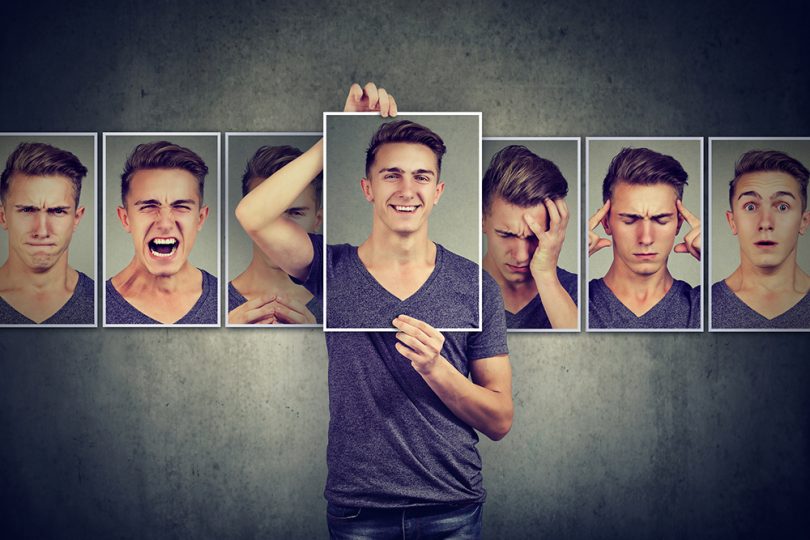Depression is seriously a complicated condition. Various kinds of depression exist. The most typical is situational, a condition in which an individual goes through a depression episode due to a typical life adventure. In disparity, unipolar depression & bipolar disorder are deemed genetic medical disorders that don’t have precise causalities & can transpire on anyone at any time.
Here we offer in detail what unipolar & bipolar depression is and their differences, & certainly, we help you discover the appropriate therapy, such as modafinil, if you are showing signs of these conditions. Continue reading this article.
What Are Bipolar Disorder and Unipolar Depression?

Is Treatment for Unipolar Depression and Bipolar Disorder the Same?
Unipolar depression is also known as major depressive disorder (MDD) or simply ‘depression’. It entangles a persistent feeling of sadness + low mood &/or loss of inquisitiveness & pleasure in usual activities or outside stimuli, & several other symptoms. The manifestations are encountered most days & certainly last for at least 2 weeks.
It’s exclusively concentrated on the “lows,” or the negative emotions, as well as signs that you may have undergone.
Bipolar disorder is denoted by polar contrasting mood swings—at one moment, you feel like you can overpower anything; at another, you can hardly get your butt out of bed. Earlier, it was dubbed manic depression, which refers to an oscillating condition between depression & mania.
The National Institute of Mental Health clarifies the primary signs of bipolar disorder as alternating episodes of high & low mood. Shifts in energy levels, sleep patterns, changes in the capability to focus, & other characteristics can dramatically influence a person’s relationships, behavior, work, & other aspects of life [1].
Most individuals encounter mood shifts at some time, but those correlated to bipolar disorder are indeed more extreme than normal mood modifications, & other signs can occur. Some individuals undergo psychosis, which can comprise hallucinations, delusions, & paranoia.
Between episodes, an individual’s mood may be regular for months or years, particularly if they are pursuing an effective treatment strategy.
Differences Between Unipolar Depression and Bipolar Disorder
Although it can sometimes be confounded because both can comprise depressive episodes, there are some fundamental differences. The phrase “unipolar” means that this state of depression doesn’t cycle via other mental states, e.g., mania. In disparity, bipolar disorders induce periods of both depression + mania.
Certainly, unipolar & bipolar depression share the same manifestation with 3 primary distinctions. Bipolar depression is undoubtedly more episodic than unipolar & it may tip into mania, so, due to the mania risk, its therapy is distinct from unipolar depression therapy.
What Is Treatment for Bipolar Disorder and Unipolar Depression?
Is treatment for unipolar depression and bipolar disorder the same? Generally, depression + bipolar disorder can be treated with a comparable strategy involving pharmaceuticals, education, & psychotherapy. Undoubtedly, for clinical depression, psychotherapy is frequently the foremost course of action.
The most typical strategies for treating major depression include:
Cognitive Behavioral Therapy (CBT)
Using diverse CBT techniques, professionals look at the way individuals think & how that influences how they behave. The prime goal is to adapt your mindset & also behaviors by adjusting distorted thought patterns. In this regard, it aids you to become aware of erroneous or negative thoughts, so you can consider challenging situations better clearly & react to them in a better influential way.
Remarkably, CBT can be an extremely helpful mechanism―either done independently or in a mix with other treatments―in treating mental health disorders, e.g., depression, an eating disorder, or post-traumatic stress disorder (PTSD).
Interpersonal Therapy (IPT)
IPT is a form of psychotherapy that mainly concentrates on lessening manifestation by enhancing the interpersonal functioning technique that usually takes between 12 & 16 weeks. Sessions generally last about 50 or so minutes & are prepared weekly. It addresses the patient’s interpersonal challenges & mood signs. The primary focus of IPT is to sustain the patient in managing these interpersonal problems & challenges to help augment how you feel.
Clinical trials have demonstrated that, undoubtedly, if you can efficaciously manage an interpersonal issue, manifestation of depression & other mood conditions tend to lessen as well. This is the central focus of IPT [2].
Acceptance and Commitment Therapy (ACT)
ACT therapy is a kind of mindful psychotherapy that aids depressed patients to stay focused on the current moment & tolerate thoughts as well as feelings without judgment. It aspires to assist you to move onward via difficult emotions, so you can certainly set your energy into recovery rather than residing on the negative.
ACT is distinct from many treatments approaches since it doesn’t focus much on manifestation lessening. Instead, it considers that individuals can live fulfilling & enriched lives by utilizing the ACT guides, regardless of signs. The method assumes that individual quality of life is predominantly dependent upon the conscious, values-guided activity & that this is achievable regardless of how many signs a patient has—provided that the patient responds to its manifestation with mindfulness.
ACT & CBT are similarly efficacious in treating patients diagnosed with depressive & also other mental disorders. Therefore, ACT is a practicable choice to CBT for treating depression [3].
Short-term Psychodynamic Psychotherapy (STPP)
STPP concentrates on problematic feelings or thoughts that impede relationships, communication, &/or performance at school or work. The ambition of the antidote is to uncover the origins of the sensations or thoughts that are frequently hidden from the patient.
Certainly, psychodynamic treatment is an efficacious way to examine the origins of your manifestation & the problematic circumstances you face. STPP therapy examines the “why” behind our thinking & actions. It concentrates on queries such as “Why am I doing what I’m doing?” & “Why am I feeling this way?”
Overall, STPP therapy permits you to gain impressive insight into yourself, sustaining you in creating a nuanced insight into how your previous adventures have shaped your present demeanor & relationships.
The objectives of STTP therapy center on achieving greater insight into your thoughts, feelings, as well as actions — most of which you might not even be intentionally aware of. In the end, STTP certainly aids to make conscious options, being free of the past, & enhance the relationships in your life, i.e., establishing clear-cut boundaries, voicing your needs, & selecting emotionally available partners.
Modafinil Augmentation Therapy
Modafinil for depression therapy may be advantageous to those with major depression, even when unresponsive to other therapies. It has a novel mode of action & may have antidepressant effects. A study showed that modafinil offers a significant advancement following 2 weeks & 3 months of treatment [4]. Another study depicts that modafinil is an efficacious augmentation technique for acute depressive episodes, comprising manifestation of fatigue, in unipolar & bipolar conditions [5].
Modafinil offers several remarkable advancements in the therapy of depression due to its dopamine reuptake inhibiting usefulness. It’s beneficial as an adjunctive treatment alongside other antidepressant meds (with physician oversight) & certainly on its own for treating the cause & the symptoms.
In this case, modafinil for depression augments dopamine concentrations in the brain & remarkably manages most of the major symptoms also linked with the condition. This comprises negative effects like obesity & fatigue. Conclusively, the modafinil tab is a robust augmentation strategy for acute depressive episodes, including symptoms of fatigue, in unipolar & bipolar disorders [6].
Antidepressants are often used in the therapy of depression. And in the issue of bipolar disorder, the most typical psychotherapy approaches utilized include CBT & the following:
Interpersonal & Social Rhythm Therapy (IPSRT)
IPSRT is certainly an add-on treatment for treating bipolar disorder + other mood disorders.
The restorative aims to underestimate disruptions to your everyday habits & rhythms since these differences can guide to disrupted slumber & an irregular mood in some individuals.
Furthermore, IPSRT can support minimizing the consequence of stress from relationship conflict. During the treatment sessions, a physician will also explore the impacts of stressful, role-changing life occurrences, such as having a child, marriage or divorce, losing a job, or getting a new job.
Take note that sleep disturbance & stress can augment the possibility of hypomania or mania. However, since IPSRT can lessen sleep abnormalities & relieve stress, it can be an efficacious therapy for bipolar disorder. It’s essential to remark that IPSRT isn’t meant to substitute the remedy for bipolar disorder. Rather, it permits regulating individual schedules to make remedy adherence easier.
Those have been treatments for unipolar & bipolar disorder. There can be other therapies. Modafinil may be a well-tolerated & efficacious alternative to conventional stimulants in the therapy of bipolar disorder, but there is a considerable risk of switching to mania with stimulant meds. However, it may be advantageous even when depressive signs aren’t prominent.
Can You Have Both Unipolar Depression and Bipolar Disorder?
The quick response is no. The elongated answer is that it’s complicated & more research is required. MDD & bipolar disorders aren’t diagnosed together—you can’t be analyzed with both conditions at the same time.
Even so, having a diagnosis benefits you since it empowers you to have a name (MDD or bipolar disorder) for your experiences & thus be capable to seek out suitable authorization to furnish you with relief & understanding via the right therapy.
Conclusion
Unipolar & bipolar depression are indeed medical conditions that can react to natural therapies such as medicine, exercise, as well as beneficial eating, but in many patients, the depression is more substantial than what nature gives us as instruments. Adding a prescription for continued suicidal depression, for instance, can indeed be life-saving. Certainly, when the brain isn’t working perfectly, meds such as modafinil can assist get our brain & body chemistry back on track. Nonetheless, consistently keep in mind that unipolar depression has one therapy protocol & bipolar disorder has another.
References
- Bipolar Disorder. Last Revised: January 2020. Nimh.nih.gov.
- Interpersonal psychotherapy: principles and applications. By John C. Markowitz and Myrna M. Weissman. Published: October 2004. Ncbi.nlm.nih.gov.
- A clinical effectiveness trial comparing ACT and CBT for inpatients with depressive and mixed mental disorders. By Mareike Samaan, Albert Diefenbacher, Christoph Schade, et al. Published: August 7, 2020. Tandfonline.com.
- A retrospective chart review of the effects of modafinil on depression as monotherapy and as adjunctive therapy. By Charles S. Price and Fletcher B. Taylor. Published: 2005. Pubmed.ncbi.nlm.nih.gov.
- Modafinil augmentation therapy in unipolar and bipolar depression: a systematic review and meta-analysis of randomized controlled trials. By Alexander J. Goss, Muzaffer Kaser, Sergi G. Costafreda, Barbara J. Sahakian, Cynthia H. Y. Fu. Published: November 2013. Pubmed.ncbi.nlm.nih.gov.
- Modafinil Augmentation Therapy in Unipolar and Bipolar Depression: A Systematic Review and Meta-Analysis of Randomized Controlled Trials (pdf). By Alexander J. Goss, Muzaffer Kaser, Sergi G. Costafreda, Barbara J. Sahakian, Cynthia H. Y. Fu. Published: November 2013. Retrieved: June 8, 2022. Repository.cam.ac.uk.
About Mark Anderson
After finding out about modafinil, I immediately noticed the poor state of information about it online and it sparked my desire to discover more and share this knowledge with others.
To help interested individuals including students and professionals with insight about a nootropic drug, I’ve created this modafinil guide which includes informative product guides, vendor reviews, buyer guides for different countries, and more.








